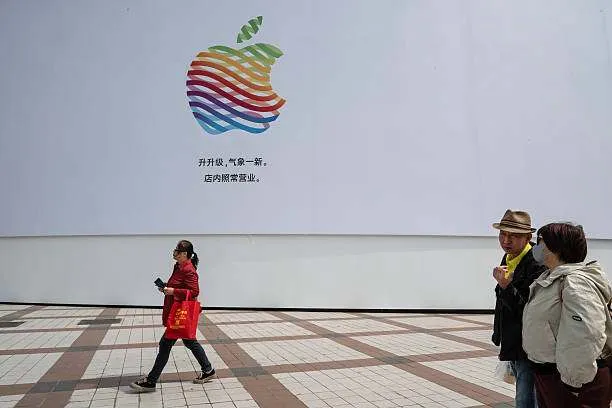China warns US of countermeasures over proposed tariff hike
Beijing slams US tariff threats as unilateral bullying and vows strong response.
 |
| People walk past an Apple store undergoing partial renovation in a commercial district on April 8, 2025, in Beijing, China. Photo by Kevin Frayer/Getty Images |
By Anna Fadiah and Hayu Andini
In an escalating war of words, China warns the US of countermeasures over proposed tariff hikes, marking a sharp turn in already tense trade relations between the world’s two largest economies. A spokesperson from China’s Commerce Ministry responded firmly after Washington threatened to impose a staggering 50 percent increase on tariffs targeting Chinese imports.
“China will take resolute countermeasures if the United States raises tariffs,” the spokesperson said on Monday, April 7. The warning comes amid mounting concerns that US-China trade tensions may spiral into a deeper economic conflict.
The official statement characterized the US move as baseless and provocative. “The so-called tit-for-tat tariffs are groundless and a typical practice of unilateral bullying,” the ministry said, underscoring Beijing’s firm rejection of Washington’s increasingly aggressive trade stance.
A battle of trade ideologies
At the heart of the dispute is the United States' continued reliance on protectionist policies to counter China’s economic rise. Since the trade war began under President Donald Trump, tariffs have been a favorite tool of American administrations seeking leverage in trade negotiations.
While US officials argue that such tariffs are meant to protect American industry and force fairer practices from Beijing, Chinese authorities see them as political weapons that disrupt global supply chains and violate established trade rules.
“China’s countermeasures are completely legitimate,” the spokesperson said. “They aim to safeguard the country’s sovereignty, security, and development interests, and to maintain the normal international trade order.”
Unilateral bullying and blackmail tactics
The rhetoric from Beijing was unusually pointed, suggesting the gravity with which China views the US’s latest threats. The ministry spokesperson accused Washington of escalating its mistakes and revealing its true intentions through what they described as “blackmailing characteristics.”
“This threat further exposes the country’s blackmailing nature, which China will never accept,” the spokesperson continued. “If the US side is determined to take the wrong path, China will fight to the end.”
Such language signals a hardened position, with Beijing prepared to go toe-to-toe with Washington if necessary. Analysts say this kind of statement isn’t just for foreign audiences—it’s also meant to rally domestic support and project strength amid economic uncertainty at home.
Economic fallout on both sides
The ongoing tariff dispute has already taken a toll on both economies. In previous rounds of tariffs, American farmers, tech firms, and manufacturers reported increased costs, supply chain disruptions, and lost access to key markets. Meanwhile, Chinese exporters have had to adjust to fluctuating demand and shifting trade routes.
However, both countries have also shown resilience. China has increasingly turned to regional trade partnerships, such as the Regional Comprehensive Economic Partnership (RCEP), while the US has pushed for reshoring critical manufacturing and expanding alliances with like-minded economies.
Still, the threat of an all-out trade war looms. Should the US follow through with the proposed 50 percent hike on Chinese goods—covering everything from electronics and machinery to consumer products—Beijing’s retaliation could be swift and sweeping.
Potential countermeasures could include tariffs of equal weight on US exports, restrictions on American companies operating in China, or broader actions affecting financial and technology sectors.
A high-stakes geopolitical chess game
Beyond trade, the tariff battle between China and the United States reflects deeper geopolitical tensions. The two powers are increasingly locked in competition over global influence, especially in areas like advanced technology, military reach, and global governance.
By labeling US tariffs as a threat to its sovereignty and development, China is signaling that it sees the conflict as not just economic, but existential. It’s a battle over the rules of engagement in the international system—and who gets to write them.
China’s sharp rebuke is also aimed at the international community. By positioning itself as a defender of global trade norms, Beijing seeks to rally support from other countries weary of US protectionism.
Uncertain path ahead for diplomacy
While neither side has closed the door to negotiations, recent developments suggest that mutual trust is in short supply. Past trade agreements, such as the Phase One deal signed under the Trump administration, failed to deliver long-term solutions.
Experts say that any future negotiation will require more than tariff rollbacks—it will demand structural changes, transparent rules, and political will on both sides.
In the meantime, companies, consumers, and investors around the world are bracing for uncertainty. If tariffs go up, prices could rise, markets could react negatively, and fragile supply chains could face further strain.
A global ripple effect
As China warns the US of countermeasures, the world is watching closely. This is not just a bilateral spat—it’s a confrontation with global consequences. From multinational corporations to emerging economies that rely on trade with both countries, the ripple effects of this dispute will be felt far and wide.
Whether diplomacy will prevail or tensions will deepen remains to be seen. But what is clear is that the stakes have never been higher, and neither side appears ready to back down.
For now, Beijing’s message is unequivocal: if Washington proceeds with its tariff threat, it should be prepared for a firm, strategic, and possibly escalated response. And for ordinary people on both sides of the Pacific, the economic fallout may soon hit closer to home than many expect.
Let me know if you'd like a shorter version for social media or a featured snippet version.
